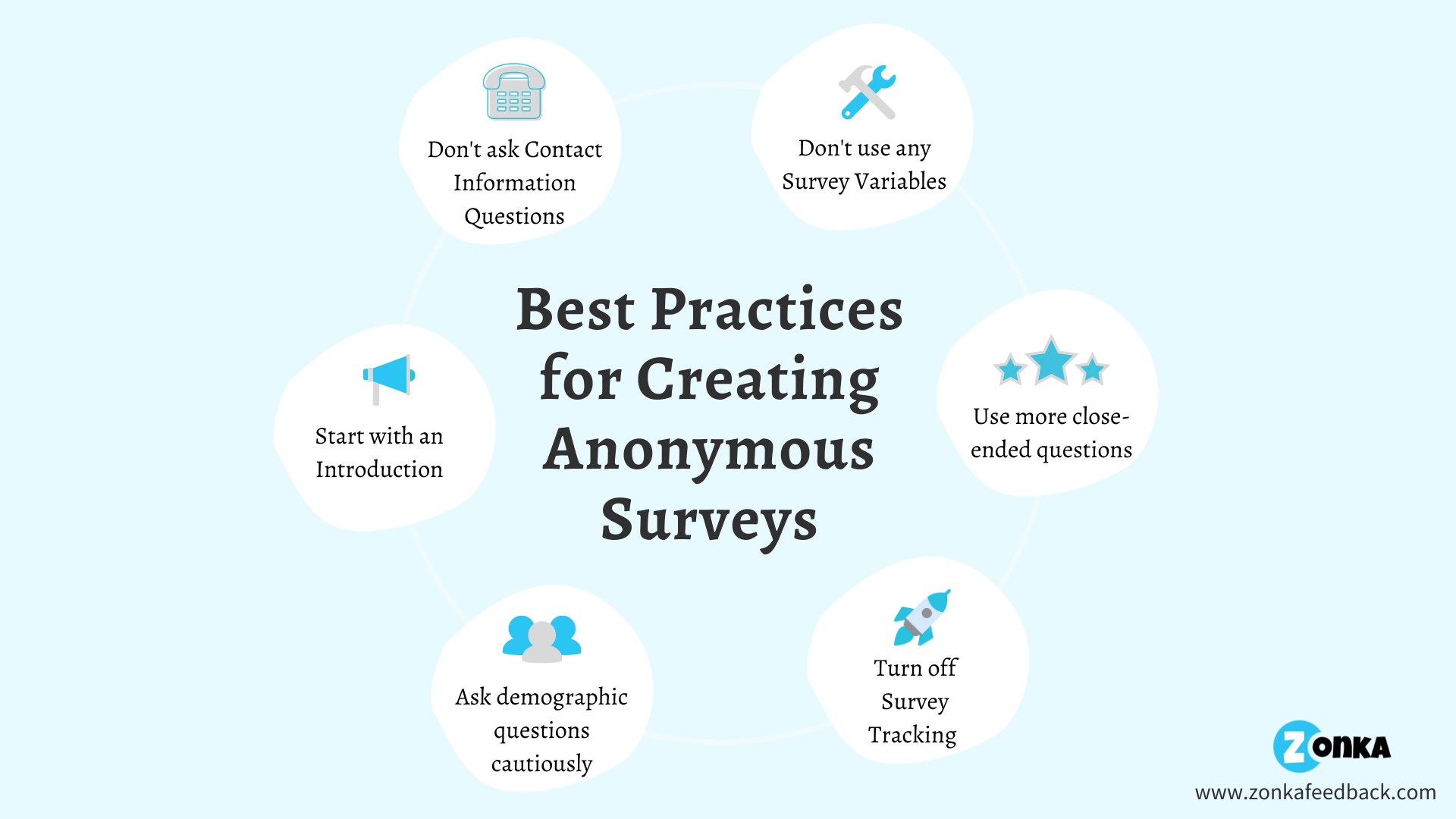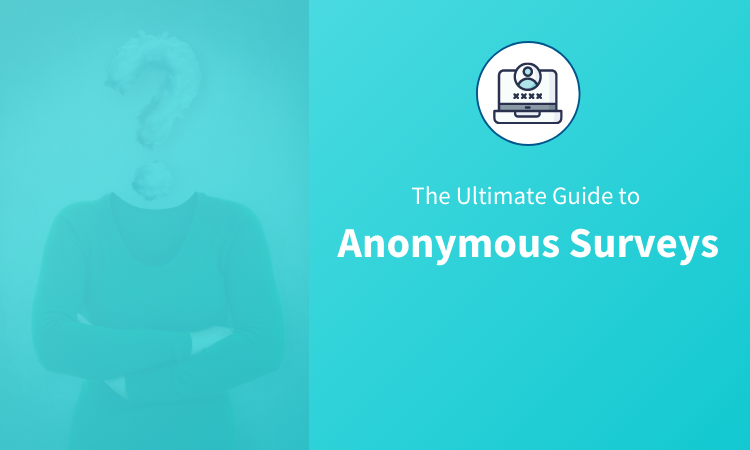While surveying your audiences and customers, some of them are reluctant to share their personal information and don’t want their identities to be revealed. There are also situations where collecting contact information or identifiable information is redundant. And some situations and regions where collecting Personal Identifiable Information may not be legally allowed. In such situations, you can create and send anonymous surveys.
Whether you are collecting Customer Feedback, Patient Feedback or Employee Feedback, anonymous surveys can make a big difference and can provide significantly more reliable and honest data.
In this guide, we discuss Anonymous Surveys, how they work, why they are useful, some popular use cases, how you can create your own Anonymous Surveys and tips to use while creating Anonymous Surveys.
Chapter 1
What are Anonymous Surveys & how do they work?
What are Anonymous Surveys?
Anonymous Surveys are surveys that maintain the anonymity of the respondent by not capturing (directly or indirectly) any personal identifiable information. These are types of survey that maintain the confidentiality of the respondent by excluding the collection of respondents' personal information and identities. You can use these surveys to collect feedback from employees, patients or customers regarding sensitive information.
How do Anonymous Surveys work?
When running surveys, a lot of data gets captured. For instance, if you're including any personal detail questions in your survey, like Contact Name, Number, Email Address, ID — those would be Contact Details and cannot be included in an Anonymous Surveys.
Similarly, for Web Surveys, capturing IP Address, Web Browser, Country would be identifiable information.
For Email and SMS Surveys, when the respondents give feedback, then the associated Email Address and Phone Number are considered to the identifiable information.
Besides the obvious information like Name, Phone Number, Email Address, Street Address, Social Security Number, IDs and more, Anonymous Surveys also exclude capturing indirect information that could be linked to participants' PII.
If any of these identifying factors are being used, they should be non-traceable to ensure anonymity.
For example
You are conducing an employee turnover survey to understand why people leave their jobs. In such situations, if employees are assured of anonymity and confidentiality, they are likely to share more honest and candid feedback which can be reliable. This in turn will help you make better business decisions.
To ensure that honest feedback is shared, employees in such a scenario should be assured that the feedback they shared cannot be tied back to their name or identity.
So what can you ask in an Anonymous Survey?
Anonymous Surveys can include questions on the Survey Subject matter and can also include a few demographic questions that cannot be linked to the identity of the participant.
Chapter 2
Why are Anonymous Surveys popular and why you can use them?
Anonymous Surveys are popular because they ensure the respondent's anonymity. Reasons why surveyors and participants like Anonymous Surveys is because of the following reasons.
1. Anonymous Surveys ensure Honest Feedback and Responses
When Survey participants know that through their survey response they can easily be identified, they may not be 100% honest. This is taken care of in Anonymous Surveys. Participants, when assured that their identity is not being captured and kept confidential, tend to be more candid and honest in their response. Honest feedback helps surveyors with more reliable data. Hence, it's a popular for both Surveyors and Survey Participants.
2. Anonymous Surveys protect the Privacy of the Respondents
Since no Personal Identifiable Information is captured in Anonymous Surveys, they protect to protect the privacy of the respondents and hence are more appealing for participants. Because the participants tend to more willingly fill out honest and reliable answers in the Anonymous Surveys, they automatically become a preferred choice for Surveyors as well.
3. Anonymous Surveys reduce Survey Response Bias
Because Anonymous Surveys cannot be linked to the respondents, any Survey Response bias by the Surveyor can be avoided. This ensures that responses are treated and evaulated in a unbiased manner.
4. Anonymous Surveys lead to high response rate
Respondents’ privacy has a powerful impact on the survey response rate. Anonymous Surveys are popularly used in situations when personal and sensitive information is to be asked. In such situations, when participants are assured of privacy and anonymity, they are more likely to respond to the survey, leading to a higher response rate.
Chapter 3
When to use Anonymous Survey?
Anonymous surveys are popularly used for employee performance evaluation, market research, engagement, course evaluation, compliance testing, and more. Here are some popular use cases:
1. To gauge overall customer satisfaction
Usually, in retail stores, shoppers are excited to participate in surveys and give feedback to improve products & services, but at the same time, they are concerned about confidentiality. For this, you can embed an anonymous survey in a newsletter. Thus, to secure respondents’ identities, you can turn off all conversion trackers.
2. To improve patient experience
Patients’ data and inputs are subject to confidentiality. Sometimes patients, in general, want to discuss some issues like medications, health issues without revealing their identities. In this scenario, send an anonymous survey to a targeted patient group.
You can also add a disclaimer; this survey will put your identity anonymous. This helps your patients to share their experiences fearlessly. It helps you to improve patients’ experience along with care and treatment.
3. To gauge employee work culture
Instead of considering individual employee’s perceptions, you can get a holistic view of how your employees perceive your company culture. How honestly your employees answer your question is dependent on how safe they are feeling. If you assure your employees that the survey they’re attending will keep their identity anonymous, they will provide reliable and honest feedback.
Chapter 4
Best Practices to build Anonymous Surveys
When creating and sending Anonymous Surveys, here are a few easy tips you can follow to ensure that your Surveys don't capture any PII and keep the respondent information anonymous.
1. Start with an Introduction
It is always a good idea to start your survey with an introduction and share the purpose of the survey with the participants. In the case of Anonymous Surveys, it is even more useful to have an introduction that informs the respondent about the anonymity of their responses and assures them that no data identifying them will be captured.
For example
"Thank you for choosing to take part in the survey. We value your feedback and assure you that we're not capturing any private information in this survey. Your identity will remain completely anonymous."
2. Don't include any Contact Information Questions in your Survey
This one is obvious, but the most important one. Any information related to the Contact or Participant's identity should not be captured or asked in the survey. While it's common sense to exclude Name, Mobile Phone Number, Email Address, Street Address from the survey, but even indirect information like Designation, Company Name, should be avoided as it can easily help you link the participant to their actual identity.
For this, double check your questions and be careful while adding any demographic questions in your survey.
3. Use more close-ended questions
Using more close-ended questions where participants are required to choose from a given set of options ensure that personal information is not captured. However, even while using these, caution should be taken to ensure no information helps you link the participant to their identity.
4. Ask demographic questions cautiously
We've said it before, but it's important to ensure that demographic questions are used cautiously. This is both to maintain anonymity, as no question should lead you to the identity of the participant, as well as to maintain sensitivity in your survey.
5. Don't use any Survey Variables
Data sent and collected while using Survey Variables is usually identifiable information and should be avoided. Automated surveys that are run through integrations from CRMs, Helpdesks, Campaign Tools, Meeting Tools and more PII. When you use these in your survey, they get passed as Survey Variables, Contact Variables or Hidden Variables and should be avoided to ensure Survey Anonymity.
6. Ensure that none of of your Survey Channels are capturing PII
Before you share your survey or send it out to participants, ensure that all the Survey Channels you're using (Offline Kiosks, Email Surveys, Web Surveys, SMS Surveys), have the respondent tracking switched off.

Chapter 5
Taking Anonymous Surveys with Zonka Feedback
Using the right Survey Software makes taking Anonymous Surveys very easy. Here's how Zonka Feedback can be helpful in helping you creating and use Anonymous Surveys for your next project.
Customize your Survey Questions
Choose from over 30+ non PII-related questions while creating your survey. Measure Customer Satisfaction, Customer Loyalty, with CX Metrics Questions like CSAT, NPS and CES. Capture feedback in participants' own words using open-ended questions like Comment Boxes. For quantitative feedback, use dropdowns, buttons, image choice questions, file upload, radio buttons, checkboxes, ranking questions and more.
Exclude Custom Variables
Using Variables in your surveys is completely optional in Zonka Feedback, even when you're using integrations with CRMs, Helpdesks, and other tools. Choose to exclude Survey, Contact and Hidden Variables when sending Surveys.
Turn off Respondent Tracking in Email and SMS Surveys
When sending Email Surveys and SMS Surveys, even if you exclude Contact Information questions, all Survey Software automatically associate the response with the Email Address or Phone Number that the survey was sent to. This makes your surveys non-anonymous and hinders the privacy and confidentiality of the participants.
With Zonka Feedback, you can turn off Respondent Tracking for Email Surveys and SMS Surveys. This ensures that the Survey Response is not associated with the associated email address and phone number and your participants' responses are completely anonymous.
💡You can manage the Respondent Tracking for every survey, every time you trigger Emails and SMS Surveys. This means you can take both Anonymous and Non-Anonymous Surveys easily from your Zonka Feedback Platform.





